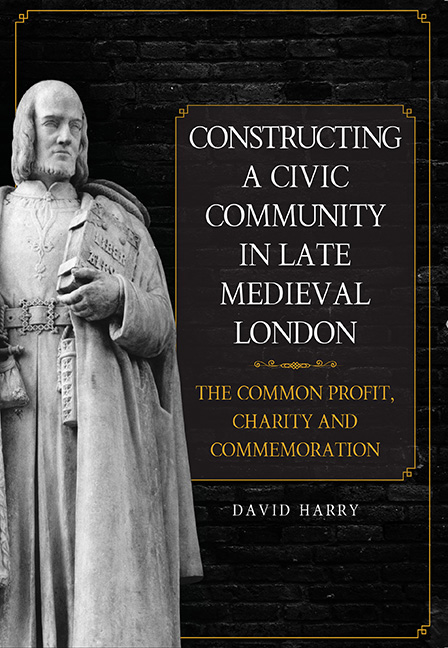Book contents
- Frontmatter
- Dedication
- Contents
- Acknowledgements
- Abbreviations
- Introduction: Common profit and charity in late medieval London
- 1 Radical London, 1376–86
- 2 Reconfiguring political authority
- 3 Civic ceremony and staging the limits of authority
- 4 The exemplary dead
- 5 Spiritual authority and the common profit
- 6 Print and the pursuit of the common profit
- Conclusion
- Bibliography
- Index
5 - Spiritual authority and the common profit
Published online by Cambridge University Press: 04 April 2019
- Frontmatter
- Dedication
- Contents
- Acknowledgements
- Abbreviations
- Introduction: Common profit and charity in late medieval London
- 1 Radical London, 1376–86
- 2 Reconfiguring political authority
- 3 Civic ceremony and staging the limits of authority
- 4 The exemplary dead
- 5 Spiritual authority and the common profit
- 6 Print and the pursuit of the common profit
- Conclusion
- Bibliography
- Index
Summary
‘For a comyn profite’
In a transformative period for London's political ideology, from c.1400 until c.1450, the common profit referred to the profits and liberties obtained by London's governing elite, which would then be distributed according to the principles of Christian charity. Good governance included obtaining these privileges for London's citizens, but it also included maintaining the peace and harmony upon which the prosperity of the city depended – or at least promoting (or trumpeting) this ideal. In this transactional relationship the two concepts were analogous: peace and harmony were maintained when the city benefitted politically and fiscally, and political stability enabled the city's leaders to invest in the spiritual lives of their citizens. Commemorating London's mayors for their contribution to the common profit represented a distinctive ideology: the establishment of a jurisdictional space neither exclusively political, nor specifically spiritual, in which the distinction between the sacred and the secular allowed for the development of new – real or imagined – communities united in love and with the shared goals of prosperity in this life and salvation beyond. By the middle of the fifteenth century, it appears that the phrase ‘common profit’ could be, at times, synonymous with the concept of ‘charity’. Here we see a political ideology acquiring a spiritual dimension, allowing London's governing elite to extend their jurisdiction over the devotional lives of those in their charge.
In 1991, Wendy Scase brought five manuscript books to the attention of the mainstream scholarly community. These manuscripts were affiliated with members of the mercantile and civil service of London – a circle of associates with connections to John Carpenter – as well as the secular clergy, including the common clerk's namesake, Bishop John Carpenter of Worcester, William Litchfield and the controversial radical, Reginald Pecock. These manuscripts were Cambridge, University Library MS Ff.vi.31; London, British Library MSS Harley 993 and Harley 2336; London, Lambeth Palace Library MS 472 and Oxford, Bodleian Library MS Douce 25.
The manuscripts are distinctive for their colophons rather than for their contents. These colophons have been reproduced on numerous occasions. Typically scholars tend to provide one colophon as representative of all. This can cause problems, however.
- Type
- Chapter
- Information
- Constructing a Civic Community in Late Medieval LondonThe Common Profit, Charity and Commemoration, pp. 119 - 148Publisher: Boydell & BrewerPrint publication year: 2019



